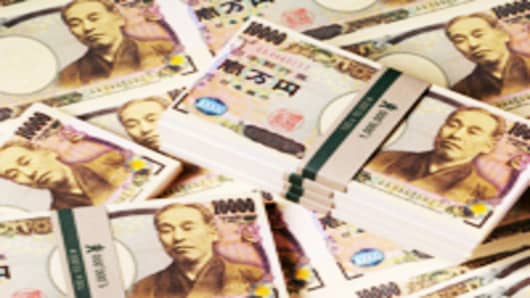The yen dropped to a 20-month low against the U.S. dollar on Monday after Japan's Liberal Democratic Party won a landslide election victory that leaders promise will usher in aggressive monetary easing policies to weaken the currency.
Former prime minister Shinzo Abe returns to power with the LDP's victory. He campaigned on a platform to boost the moribund economy with hyper-easy monetary policy and big fiscal spending to beat deflation, a recipe for weakening the yen that gives Tokyo an export advantage in the international markets.
The euro rose against the yen as well, but saw its gains on the U.S. dollar undermined by European Central Bank President Mario Draghi, after he reiterated concerns over slow growth of Europe's economy.
In midday New York trade, the greenback was nearly flat at 83.89 against the yen, its best level since April 2011. The euro climbed 0.7 percent to 110.34 yen but fell back from its 8 1/2-month high of $1.3191 to trade at flatly $1.316 against the U.S. currency.
"Just looking at the euro's movement's today, it is coming off the highs after Draghi's comments about growth. Still, it is in an upward trend channel," said Eric Viloria, senior currency strategist at FOREX.com in New York.
There were competing forces tugging on the euro. A factor leading to the weakness was Draghi saying the medium-term outlook for the euro zone economy remained "challenging". Weak demand is expected to extend into 2013, and only a gradual recovery is forecast toward the end of that year while interest rates are expected to continue at record lows.
On the side strengthening the euro against the U.S. dollar was Richmond Federal Reserve Bank President Jeffrey Lacker who said he expects it will be another three years until the U.S. unemployment rate drops to 6.5 percent. That means monetary policy is expected to remain in the zero to 0.25 percent range through 2015, conditions that weaken the buying power of the U.S. dollar.
LDP Landslide
Analysts expect the prospect of ultra-loose monetary policy in Japan to weaken the yen further in coming weeks, depending on the pace of policy change. However, given that bets against the yen are already hefty, losses could be limited.
The LDP's massive victory will give the new government a greater chance to push through policies and possibly appoint a more dovish central bank chief next year. The LDP and its ally the New Komeito party secured the two-thirds majority needed to overrule parliament's upper house.


